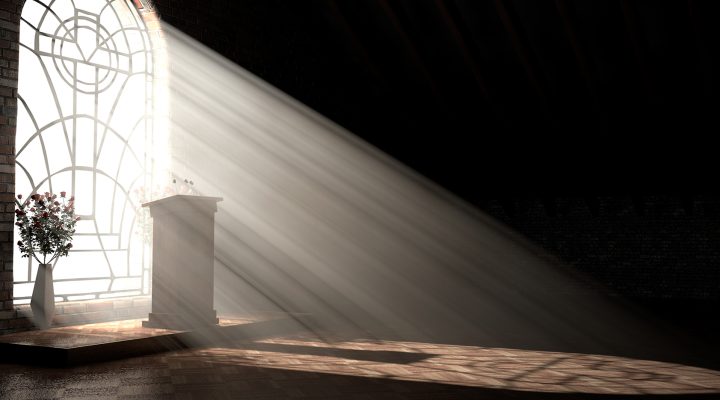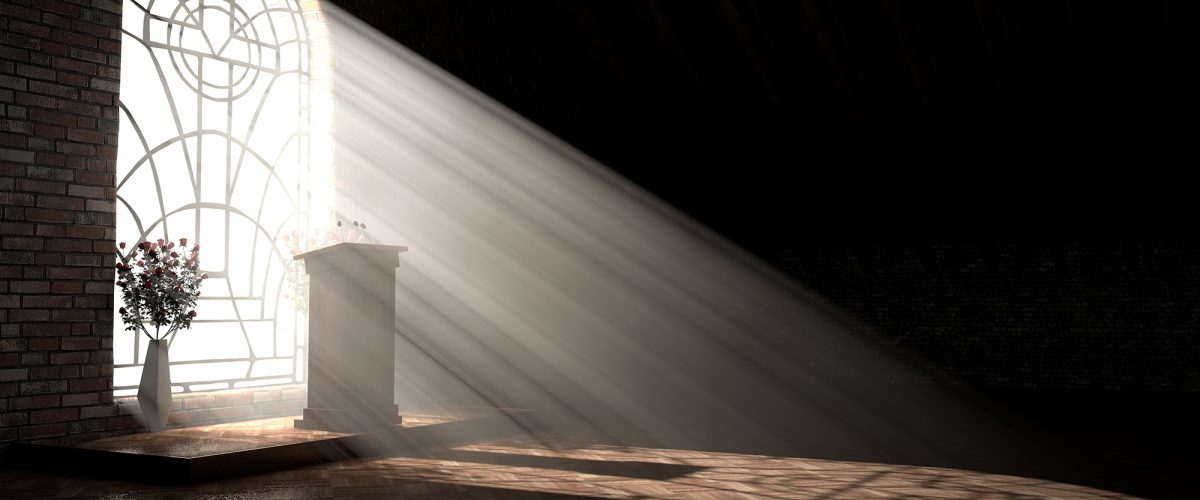Scanning the last page of my notes, I throw myself into the benediction with the force of a poorly hung door caught unexpectantly by a summer breeze. I attempt to hold the moment by stitching together a series of detached sentences, but it ends more abruptly than I would have liked.
Ending abruptly. That should have been my sermon title this morning. How awkwardly fitting.
When the collective amen finally drops, the pianist strikes up the postlude while I unsuccessfully strive to look busy for 90 seconds. The waning melody floats in the air as the last ivory gets tickled. I glanced around the sanctuary noticing no one has moved.

Justin Cox
No mass exodus toward the exits. No catch-up conversations taking place over pews. Just a sea of compassion-lined faces staring back at me. It was the opposite of every head bowed and all eyes closed.
Looking up at the balcony, the most dependable 13-year-old audio/tech person I’ve ever known assures me the livestream is off. The temperature in the room is cool, but am I noticing a cold sweat forming on the back of my neck? There’s dampness on my hands like I’ve just had the unfortunate pleasure of being the first person to discover the paper towel dispenser is out in a public restroom. Giving them a reactionary shake, and with what little reverence I have left good and rattled, I take a deep breath and move ahead.
Sure, by now, many knew what was coming. The official statement had been attached to the church letterhead and mailed out earlier that week, ushering in the trifecta rippling effect of drop-in-office visits, phone calls and texts from concerned people. The conversations were different, but they were all the same. Like the legendary Hydra of Greek lore, whose severed heads would produce two more, an initial question only fueled another as they attempted to make sense of the news I had given.
“Sure, by now, many knew what was coming. The official statement had been attached to the church letterhead and mailed out earlier that week.”
I am resigning as your pastor.
Different questions, but all stemming from the same source. Why?
Followed closely by, Did we do something wrong?
Rest assured, I did not walk into those heart-to-hearts unprepared. I did my research. In the weeks leading up, I consumed countless articles about ministry transitions. I went as far as to confide in a few trusted peers and mentors — those who had worn these uncomfortable resignation shoes before me, and I got some helpful information.
I received some sage advice, but I did not get everything. My self-terminating thesis still had holes, and while most of it made sense to me, I worried if it would make sense to others. Just goes to show you can spend an exorbitant amount of time on something only to discover it does not always add up to what you want it to once you begin processing it out loud.
In my experiences, my best-laid plans often play out more like random thoughts thrown in a blender with the pulse setting on full blast. The final result being the more I press a subject, the messier it gets. This spiral continues until I finally accept my limitations, channel my inner James Tiberius Kirk, and willfully waltz into my own Kobayashi Maru, a scenario without a winning outcome but that welcomes me to test my character.
This realization offers some relief, but the knot in my stomach remains present as I stand in front of a group of people, knowing my words to them will change how they and I interact with one another moving forward.
“Can I be both appreciative and comforting? Can I be truthful in my uncertainty?”
My thoughts race to what I can offer them right now. Can I be both appreciative and comforting? Can I be truthful in my uncertainty? Can I be open in my confidence that this is the right decision? Will they see how exposed I feel, how vulnerable I am right now?
As I begin speaking, I try and navigate each word carefully. I’ve chosen them for a reason, offering glimpses into what has been life-giving to me these last few years, even amid a global pandemic where it often felt like all life was leaving me. I decided against addressing too much of the why question here. I’ve got weeks ahead to have those one-on-one conversations. The more I talk, the more this sounds like a middle school breakup story: It’s not you, it’s me. My leaving here has nothing to do with what you all did or did not do. I then make it a point not to pin this on God. The people need to know God didn’t do this to them either.
No, God isn’t dragging me into the Great Resignation kicking and screaming. Neither is God granting this relocation as one filled with an endless supply of faux positivity. I’m not strutting, smiling and brandishing empty goodbyes as I sashay away to a new faith community. You’re not going to find this in the pages of Your Best Life Now. Yes, God is involved. Yes, let us agree the Spirit is unpredictable, but if I hear another pastor invoke God as the sole cause they’re leaving a community, my bullshit meter will finally break and give up its holy ghost.
Look, I’d love to wax poetically about how God whispered in my ear during an early morning devotion that it was time to go, but this wasn’t the case. I wish I could share a vision I had that made all this clear. I want to tell the faces looking at me this morning I received an irrefutable sign waking me from my sleep, but I can’t — because my faith and calling never have been that simple.
Unlike Charleston Heston, God didn’t turn my hair white and bestow upon me a direct path forward. My spiritual journey is riddled with fewer promised lands and more bogs of eternal stench. I’ve grown a lot in these conveniently mired and murky places. I’ve picked up some survival tricks here and there, but they have come at the cost of scars. Scarring is what leaving a place and its people does to a minister. It’s not a question of whether it will hurt but how much of a limp you’re going to have afterward.
“Scarring is what leaving a place and its people does to a minister. It’s not a question of whether it will hurt but how much of a limp you’re going to have afterward.”
No, this was less Damascus Road and more a slow-burn of revelation unpacking a series of down-the-rabbit-hole-style questioning, prodding me to deal with the practical. Would this potential community be open to my family’s unique background, culture and traditions? Will my family be receptive to those where we’re going? Will my family find their own opportunities and connections? And perhaps the most uncomfortable to discuss, will I be compensated fairly?
Sadly, openly airing the pragmatic in ministry circles is more sanctimonious than sexy. This needs to change. Real talk needs to happen. I’m skimming the surface here, but you get the point. Deciding to exit a place and start a different “call” isn’t clean cut. There are a lot of moving parts. I want to own this fact.
With the divine nudge measured and the rationale weighed, there are other times you just know it’s over. You sense your time in a place is coming to an end. Feeling this nudge a few months back, I pulled out the cover letter I sent to this congregation years ago. The person who wrote it wasn’t me anymore. I have changed. My family dynamics have changed. My sense of call has changed. To stay would be comfortable, but it wouldn’t be comforting for either party.
“To stay would be comfortable, but it wouldn’t be comforting for either party.”
Much of this came up during many late-night conversations between my spouse and I. We made space for heartfelt talks about what mattered to us and where we saw ourselves in the future. Sharing some things we struggled with the last few years, we found out we’re not Wendell and Tanya Berry (damn, that confession hurts a bit). We wanted, for now, to be in a more populated area.
While it might sound small and superficial, deciding whether to have Thai or Greek takeout on a random Tuesday night is meaningful because it represents a level of diversity we’ve missed. The deliciousness of baklava and khao soi aside, other concerns were more genuine and spoke about our life stage with young children: How fast we can get to a reputable hospital if we need medical attention?
Three years ago, none of this was on the radar, but our time in a very rural setting allowed us to name our need for a type of proximity we desired. Conversations leaving us somewhere between takeout and accessible health care helped us determine this new call. We saw it offering us a chance to thrive in a place and not just feel like we were sustaining.
Behind the pulpit, I’m almost done. Thank you so much for the privilege of being your pastor, your neighbor and part of this family. We’ll be connected with y’all always. I say those words, and I mean them. My sentimentality is in overdrive now.
I’m prepared for this part but not ready for the gratitude and kindness that washes over me from those present. Is this what being baptized in the Spirit means? The Spirit immersing you with love and appreciation? Washing over you with genuine affection? Dipping you in indebtedness, the kind of thing you can’t repay but can only hope to pass on?
I want to preserve this scene in my mind for one of those days when I wonder if it’s all worth it. I wonder if my new community will know how much the previous one will gift them.
Part of my “call” is making sure they do.
Justin Cox serves has served as senior pastor of the United Church of Lincoln Vermont since 2019. He received his theological education from Campbell University and Wake Forest University School of Divinity. He is an ordained minister affiliated with the Cooperative Baptist Fellowship and is currently enrolled in the Doctor of Ministry program at McAfee School of Theology. Besides reading, baking and amateur gardening, most of Justin’s time is spent with his spouse, Lauren, and their two daughters. He will begin his tenure as senior pastor of Second Baptist Church of Suffield, Ct., in September 2022. His ramblings may be read at blacksheepbaptist.com.
Related articles:
10 suggestions for welcoming a new pastor | Opinion by Barry Howard


